- Home
- Mitch Albom
The Time Keeper Page 2
The Time Keeper Read online
Page 2
“Did you really play with him when you were a boy?” his son asked.
Dor nodded. Alli took her husband’s arm. “Your father was a faster runner and a better climber.”
Dor smiled. “Your mother was faster than us all.”
The children laughed and pulled at her legs. “If your father says it, it must be true,” she said.
Dor counted the slaves working on Nim’s tower, counted them until he ran out of numbers. He thought about how differently his life and Nim’s life had turned out.
Later that day, Dor carved notches on a clay tablet to mark the sun’s path across the sky. When the children reached to play with his tools, Alli gently moved their hands away and kissed their fingers.
History does not show it,
but as Dor grew older, he dabbled in every form of time measurement that science would later credit to others.
Long before the Egyptian obelisks, Dor was catching shadows. Long before the Greek clepsydras, Dor was measuring water.
He would invent the first sundial. He would create the first clock, even the first calendar.
“Ahead of his time.” That’s a phrase we use.
Dor was ahead of everyone.
Consider the word “time.”
We use so many phrases with it. Pass time. Waste time. Kill time. Lose time.
In good time. About time. Take your time. Save time.
A long time. Right on time. Out of time. Mind the time. Be on time. Spare time. Keep time. Stall for time.
There are as many expressions with “time” as there are minutes in a day.
But once, there was no word for it at all. Because no one was counting.
Then Dor began.
And everything changed.
7
One day, when his children were old enough to run hillsides on their own, Dor had a visit from King Nim, his childhood friend.
“What is this?” Nim asked.
He was holding a bowl. There was a small hole near the bottom.
“A measure,” Dor answered.
“No, Dor.” Nim laughed. “It is a useless bowl. Look at this hole. Any water you pour in will drip out.”
Dor did not challenge him. How could he? While Dor spent his days with bones and sticks, Nim led attacks on neighboring villages, took people’s possessions, declared that they must follow him.
This visit was unusual, the first in many moons. Nim wore an impressive wool robe, dyed purple, a color of wealth.
“You know of the tower we build?” Nim asked.
“It is unlike anything I have ever seen,” Dor said.
“That is just the start, friend. It will take us to the heavens.”
“Why?”
“To defeat the gods.”
“Defeat them?”
“Yes.”
“And then?”
Nim puffed out his chest. “Then I shall rule from above.” Dor looked away.
“Join me,” Nim said.
“Me?”
“You are clever, I know from our days as children. You are not mad as the others say. Your knowledge and these … things …”
He pointed to the instruments.
“They could make my tower stronger, yes?”
Dor shrugged.
“Show me how they work.”
For the rest of the afternoon, Dor explained his ideas.
He showed Nim how the shadow from the sun stick lined up with his markings, and how pointers on the stick broke the day into parts. He laid out his collection of stones that charted the stages of the moon.
Nim did not understand most of what Dor said. He shook his head and insisted the sun god and the moon god were in constant battle; that accounted for their rise and fall. Power was what mattered. And power was what awaited him once the tower was complete.
Dor listened, but he could not see Nim storming the clouds. What chance would he have?
When their conversation finished, Nim grabbed one of the sun sticks.
“I will take this with me,” he said.
“Wait—”
Nim pulled it to his chest. “Make another. Bring it when you come to help with the tower.”
Dor looked down. “I cannot help you.”
Nim ground his jaw back and forth.
“Why not?”
“I have my work.”
Nim laughed. “Putting holes in bowls?”
“It is more than that.”
“I will not ask again.”
Dor said nothing.
“As you wish.” Nim exhaled. He stepped to the doorway. “But you must leave the city.”
“Leave?”
“Yes.”
“Where?”
“That does not concern me.” Nim examined the carvings on the sun stick. “But go far. If you do not, my men will force you onto the tower—as they will the others.”
He moved past the bowls and lifted the one with the small hole in it, turned it over, then shook his head.
“I will never forget our childhood,” Nim said. “But we will not see each other again.”
8
Sarah Lemon is running out of time.
It is 7:25 P.M. and her black jeans—which she finally found in the washing machine—are now tumbling in the dryer, on the highest heat, and her hair is so unruly she wants to cut it off. Her mother has twice returned to her room, the last time holding a glass of wine, and offered an opinion on Sarah’s makeup. (“OK, Mom, I got it,” she said, dismissing her.) She has chosen a raspberry T-shirt, the black jeans—if they ever dry!—and the black boots with the heels. Heels will make her look thinner.
She is to meet her boy outside a convenience store—Eight-thirty, eight-thirty!—and maybe they will eat something or go somewhere. Whatever he wants. Until now, they have only seen each other on Saturday mornings at a shelter where they work. But Sarah hinted several times about getting together and last week he finally said, “Yeah, OK, maybe Friday.”
Now it is Friday and she feels goose bumps on her skin. A boy like this—popular, good-looking—has never paid attention to Sarah before. When she is with him, she wants the minutes to go slower, yet until she sees him, they cannot pass quickly enough.
She looks in the mirror.
“Ahgg, this hair!”
Victor Delamonte is running out of time.
It is 7:25 P.M. The East Coast offices will be closed but the West Coast will not.
He picks up the phone. He dials a different time zone. He asks for Research. While he waits, he eyes the books on his shelves and does a mental inventory. Read it. Never read it. Never read it …
If he used every minute the doctor said he had left, he still wouldn’t finish all these volumes. And this is one room. In one house. Unacceptable. He is rich. He must do something.
“Research,” a female voice says.
“Yeah, it’s Victor.”
“Mr. Delamonte?” She sounds nervous. “How can I help?”
He thinks about Grace and the wheelchair she ordered. He will not give up so easily.
“I want you to get on something right away. Send me whatever you find.”
“Certainly.” The researcher taps her keys. “What’s the topic?”
“Immortality.”
9
That night, after Nim’s visit, Dor and Alli climbed a hillside to watch the sun set.
They did this almost every evening, recalling the days they chased each other as children. But this time, Dor was quiet. He carried several bowls and a jug of water. When they sat, he told Alli about Nim’s visit. She began to cry.
“But where are we to go?” she said. “This is our home, our family. How will we survive?”
Dor looked down.
“Do you want me enslaved on that tower?”
“No.”
“Then we have no choice.”
He touched her tears and wiped them away.
“I am afraid,” she whispered.
She hugged her arms around his ches
t and leaned her head into his shoulder. She did this every night, and like most small demonstrations of love, it had a large impact. Dor felt a surge of calm whenever she held him, like being wrapped in a blanket, and he knew no one else would ever love or understand him the way she did. He nestled his face into her long dark hair, and he breathed a way he never breathed except when he was with her.
“I will protect you,” he promised.
They sat for a long while, watching the horizon.
“Look,” Alli whispered. She loved the sunset colors—the oranges, the soft pinks, the cranberry reds.
Dor stood up.
“Where are you going?” Alli asked.
“I must try something.”
“Stay with me.”
But Dor moved to the rocks. He poured water into a small bowl, then placed a larger one beneath it. He removed a piece of clay plugged inside a hole in the upper bowl—the one Nim had mocked—and the water began to drip through, one silent splash after another.
“Dor?” Alli whispered.
He did not look up.
“Dor?”
She pulled her arms around her knees. What would become of them? she thought. Where would they go? She lowered her head and squeezed her eyes shut.
If one were recording history, one might write that at the moment man invented the world’s first clock, his wife was alone, softly crying, while he was consumed by the count.
Dor and Alli stayed on the hillside that night.
She slept. But he fought his weariness to be awake when the sun rose. He watched the sky change from night black to deep purple to a melting blue. Then a burst of rays seemed to whiten everything, as the dome of the sun poked over the horizon, like the golden pupil of an opening eye.
Had he been wiser, he might have marveled at the beauty of the sunrise and given thanks for being able to witness it. But Dor was not focusing on the miracle of the day, only on measuring its length. As the sun appeared, he slid the lower bowl away from the upper bowl’s dripping, took a sharp stone, and notched the waterline.
This, he concluded—this much water—was the measure between darkness and light. From now on, no one needed to pray for the sun god to return. They could use this water clock, see the level rising, and know dawn was coming. Nim was wrong. There was no divine battle between day and night. Dor had captured them both in a bowl.
He dumped the water.
God saw this, too.
10
Sarah is anxious.
She hurries down the steps in her still-warm black jeans. She feels a flush of panic. She remembers a night two years ago, one of the few times she’s gone out with a boy. A Winter Formal dance. A kid from her math class. His hands were clammy. His breath smelled like pretzels. He left with his friends. She had to call her mother to pick her up.
This is different, she tells herself. That was a weird boy; this is a young man. He is eighteen. He is popular. Any girl at school would want him. Look at his photo! And he’s meeting her!
“What time will you be back?” Lorraine asks, looking up from the couch. Her wineglass is nearly empty.
“It’s Friday, Mom.”
“It’s just a question.”
“I don’t know, OK?”
Lorraine rubs her temples. “I’m not the enemy, honey.”
“Didn’t say you were.”
She checks her phone. She cannot be late.
Eight-thirty! Eight-thirty!
She yanks her coat from the closet.
Victor is anxious.
He taps his fingers on the desk, waiting for Research. Grace’s voice comes over the intercom.
“Honey? Are you hungry?”
“Maybe a little.”
“How about some soup?”
He stares out the window. This New York penthouse is one of five homes they own. The other four are in California, Hawaii, the Hamptons, and central London. Since his cancer diagnosis, he hasn’t been to any of them.
“Soup is fine.”
“I’ll bring it in.”
“Thanks.”
She has been kinder since his illness, sweeter and more patient. They have been married forty-four years. The last ten they’ve been more like roommates.
Victor picks up the phone to see how Research is coming. But when Grace enters with the soup, he hangs up.
11
Dor and Alli loaded their meager possessions on a donkey and went to live in the high plains.
Their children, it was decided, would be safer with Dor’s parents. Alli was heartbroken. Twice she made Dor turn back, just so she could hug them again. When their oldest daughter asked, “Am I the mother now?” Alli collapsed, sobbing.
Their new abode was small, made of bundled reeds. It was weak against the wind and rain. Alone, without family, the couple relied solely on each other. They grew what they could, herded sheep and a single goat, and rationed water from long trips to the great river.
Dor continued his measuring, using bones, sticks, the sun, moon, and stars. It was the only thing that made him feel productive. Alli grew withdrawn. One night Dor saw her hugging their son’s swaddling blanket and staring at the floor.
From time to time, Dor’s father would bring them food—at his wife’s insistence—and each visit, he spoke about Nim’s tower, how high it had grown, how the bricks were made with fir, how the clay mortar came from the fountains of Shinar.
Already, Nim had climbed near the top, shot an arrow into the sky, and claimed it had landed with blood on its tip. The people bowed to him, believing he had wounded the gods. Soon he and his best warriors would reach the clouds, defeat whatever waited for them, and rule from above.
“He is a great and powerful king,” Dor’s father said.
Dor looked down. Nim was the reason they were living in exile. The reason he could not hold his children each morning. He thought about his life as a child, he and Nim and Alli running up the hills. Nim was just another man to him, really still a boy, always wanting to be the strongest.
“Thank you for the food, Father,” Dor said.
12
“Dor. Visitors.”
Alli rose to her feet. An elderly couple was approaching on foot. Many moons had now passed since Dor’s banishment—on our calendar, more than three years—and Alli was grateful for any company at all. She greeted the man and woman and offered them food and water, even though there was precious little to spare.
Dor was proud of his wife’s kindness. But he worried about the visitors, who did not look well. Their eyes were red and watery and their skin had dark blotches. When he was alone with Alli, he warned her, “Do not touch them. I fear they are diseased.”
“They are alone and poor,” she protested. “They have no one else. Show them the mercy we would want in return.”
Alli served the visitors barley cakes and barley paste and the little goat’s milk they had. She listened as they told their tale. They, too, had been cast out from their village, the people fearful that the dark blotches meant they had been cursed. They lived now as nomads, in a tent made of goat skins. They moved in search of sustenance and waited for the day they would die.
The old woman cried when she said this. Alli cried with her. She knew what it felt like to lose your place in the world. She held the small cup so the old woman could sip.
“Thank you,” she whispered.
“Drink,” Alli said.
“Your kindness …”
She reached out to embrace Alli, her wrinkled hands trembling. Alli leaned in and nuzzled her cheek. She could feel the old woman’s tears mixing with hers.
“Be at peace,” Alli said.
As they left, Alli slipped the woman a skin filled with the last of their barley cakes. Dor checked his water clock bowl and saw a fingernail’s length until the sun disappeared.
13
Before you measure the years, you measure the days.
And before the days, you measure the moon. Dor had done this in exile, charting its stage
s—full moon, half moon, quarter moon, moonless. Unlike the sun, which looked the same every day, the changing moon gave Dor something to count, and he gouged holes on clay tablets until he noticed a pattern. The pattern was what the Greeks would later call “months.”
He assigned a stone to every full moon. He notched tablets for moons in between. He created the first calendar.
And now all his days were numbered.
On the fifth notch of the third stone, he heard Alli cough.
Soon her cough grew harsher, a low explosion that threw her head forward.
At first she tried to continue as usual, tending to daily tasks inside the reed house. But she grew so weak that she fell one day while preparing a meal, and Dor insisted she lie on a blanket. Perspiration beaded on her temples. Her eyes were red and teary. Dor noticed a blotch on her neck.
Inside, he was angry. He had warned her not to touch the visitors, and now they had passed on their curse. He wished they had never come.
“What should we do?” Alli asked.
Dor dabbed her forehead with the blanket. He knew they should seek out an Asu, a medicine man, who could give Alli roots or cream to make this disease go away. But the city was too far. How could he leave her? They were alone on these high plains, cut off from options.
“Sleep,” Dor whispered. “You will be better soon.”
Alli nodded and closed her eyes. She did not see Dor blink away his tears.
14
Sarah speaks to time. “Go slower,” she says.
She slips out the door and heads up the street. She imagines the boy with the coffee-colored hair. She imagines him greeting her with a sudden, sweeping kiss.
She looks back and sees a light go on in her mother’s bedroom. She quickens her pace. It is not beyond her mother to open the window and yell down the block. Like many teenage girls, Sarah finds her mother a huge embarrassment. She talks too much. She wears too much makeup. She is constantly correcting Sarah—Don’t slouch, Fix your hair—when she’s not complaining to friends about Sarah’s father, who doesn’t even live in the state anymore. Tom did this. Tom forgot that. Tom is late on the check again. They used to be closer, but lately mother and daughter share a mutual incomprehension; each seems baffled by the other. Sarah does not discuss boys with Lorraine; not that there has been much to discuss until now.

 Tuesdays With Morrie
Tuesdays With Morrie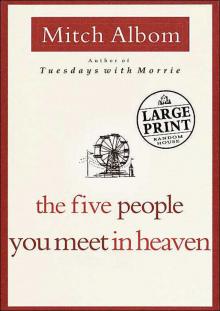 The Five People You Meet in Heaven
The Five People You Meet in Heaven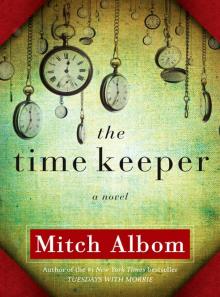 The Time Keeper
The Time Keeper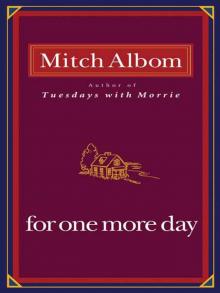 For One More Day
For One More Day The First Phone Call From Heaven: A Novel
The First Phone Call From Heaven: A Novel The Magic Strings of Frankie Presto
The Magic Strings of Frankie Presto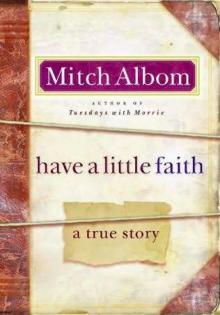 Have a Little Faith: A True Story
Have a Little Faith: A True Story The Next Person You Meet in Heaven
The Next Person You Meet in Heaven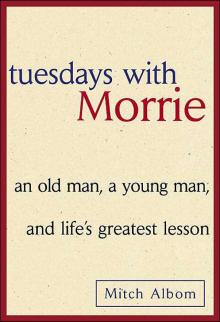 Tuesdays with Morrie: an old man, a young man, and life’s greatest lesson
Tuesdays with Morrie: an old man, a young man, and life’s greatest lesson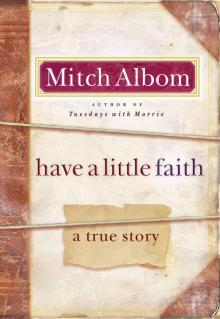 Have a Little Faith
Have a Little Faith